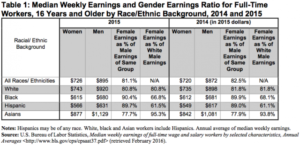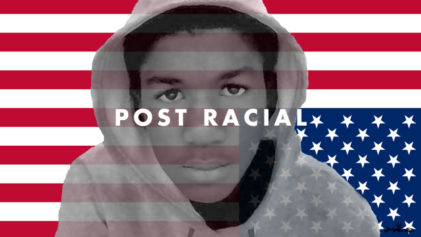
Wages increased for men and women from 2014 to 2015, but women — particularly Black women — were left behind, the report says. From the data collected, women’s wages are increasing at a snail’s pace.
“Progress in closing the gender earnings gap based on median annual earnings has also slowed considerably. If the pace of change in the annual earnings ratio were to continue at the same rate as it has since 1960, it would take until 2059 for women and men to reach earnings parity,” according to researchers Ariane Hegewisch and Asha DuMonthier.
The report breaks down findings by race in addition to gender, and the findings are not great for women. Almost every female earner makes $100-200 less than a male earner of the same race, the report said.
“In 2015, the ratio of women’s to men’s median weekly full-time earnings was 81.1 percent, a decrease of 1.4 percentage points since 2014, when the ratio was 82.5 percent. Women’s median weekly earnings for full-time work were $726 in 2015 compared with $895 for men. Controlling for inflation, women’s earnings increased by 0.9 percent, while men’s earnings increased by 2.6 percent since 2014,” the report said.
Black women earned about $615 weekly in 2015, while Black males earned $680, which is down by a dollar from the previous year. While other groups have had their wages increased by double digits, Black and Hispanic men had weekly wage decreases in 2015.
The numbers also suggest that Black and Hispanic workers earned the least in comparison to their counterparts. Compared to white male and female earners, the top earners on the list are Asian-Americans — both male and female. Asian-American men earned $1,081 weekly in 2014, and their earnings went up to an average of $1,129 in 2015.
In recent news, workers across the nation have gone on strike to demand higher wages. Many are stomping for a $15 minimum wage that would help with the increased cost of living.
The report is a painful reminder that the economic gap between women and men and various races is a current problem.


